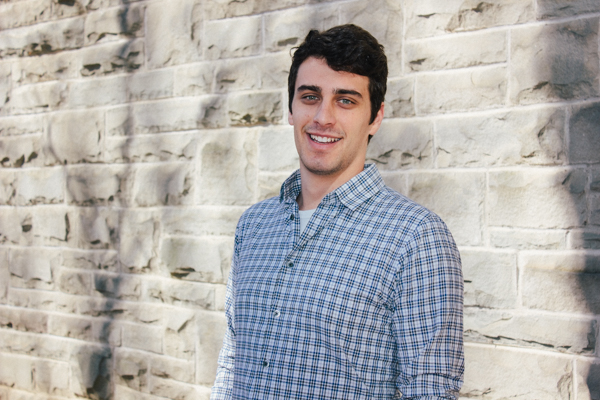Admissions
Equity, Diversity, Inclusion and Decolonization
The School of Graduate and Postdoctoral Studies is committed to equity, diversity, inclusion and decolonization in all aspects of graduate and postdoctoral studies. For more information regarding these commitments please visit grad.uwo.ca/edi-d.
Anatomy and Cell Biology
Doctor of Philosophy (PhD)Meet Tyler Beveridge, PhD candidate in Anatomy and Cell Biology

Supervisors: Dr. Brian Allman and Dr. Nicholas Power
What’s the best advice you could give to someone considering applying to your graduate program?
Be true to what excites you, and even more so, what doesn’t excite you. When speaking about potential projects with different investigators, strongly consider if you can see yourself taking ownership of and loving the project. If you can’t, then keep looking.
Where did you complete your undergraduate degree?
I came from McMaster where I studied Health Sciences (BHSc). I then completed the MSc Clinical Anatomy program at Western University before starting my PhD.
Why did you come to Western for your graduate degree?
It is one of only two places in Canada to offer a graduate degree in human anatomy, and is the only university which offered co-mentorship with clinicians working in a very specialized field of Urology that I was interested in.
Describe your research in 100 words or less.
The surgery for testicular cancer involves the removal of metastatic masses from the deep abdomen. While this surgery effectively cures the cancer in most cases, the patients are often rendered infertile because of unintended trauma to the nerves which control ejaculation. Currently, the location of these nerves is unknown and my research is focused on: (1) characterizing their anatomy, and (2) using this information to inform surgical techniques in order to facilitate sparing these nerves during surgery such that fertility is maintained, postoperatively.
Where’s your favourite place on campus to work?
It always turns out that great ideas and great collaborations begin at The Grad Club.
What is your “dream” career?
Something that is always evolving, requires very specialized hands-on skills, and is collaborative but also has room for autonomy.
Where is “home” for you?
Gilford, Ontario … not many people know where that is though; it is near Barrie. Farm Country.
What are you most passionate about?
Efficiency. I love being efficient… and also things that are mathematically justified. You know, things like diagonally cutting through a parking lot on your walk home (instead of walking around the perimeter), and realizing that you saved yourself from having to walk an unnecessary extra distance. Pure satisfaction.
What one thing would you like people to know about you?
I can make a mean bowl of guacamole.
Program Websites
Program Contact
Miranda Fullerton (anatomy@uwo.ca)Academic Program Coordinator
Department of Anatomy & Cell Biology
Western UniversityMedical Sciences Rm 443
London, Ontario N6A 5C1
t. 519-661-2111 ext. 81524
f. 519-850-2906
The Anatomy & Cell Biology Program offers a modern collaborative training experience catering to the needs of the individual student pursuing an MSc or PhD degree. Our dedicated, award-winning mentors and state-of-the-art facilities provide a rich training environment in which students can immerse themselves in one or more academic disciplines, including cell biology, neurobiology, anatomical sciences, and/ or education scholarship. The Biological Research field is a research-intensive, thesis-based program designed to prepare students for a career as a research scientist in academia or industry. Our Clinical Anatomy field offers a unique training experience consisting of course work, research, and hands-on teaching experience; and is intended to prepare the next generation of medical educators and scholars.

The Own Your Future doctoral professional development program will help you become a career-ready graduate with the skills necessary to excel in your studies and achieve your future goals. By participating in the program, you will assess your own strengths and opportunities for growth, choose what skills you want to enhance during your time at Western, and learn how to articulate the skills you gained in your degree to optimize your future career opportunities. To learn more, visit www.uwo.ca/ownyourfuture.
Program Length
- 12 Terms
Program Design
- Full-time study
- Thesis-based
Funding Information
Applicants are encouraged to apply for the following scholarships (if eligible):
- Vanier Canada Graduate Scholarships (Vanier CGS)
- Social Sciences and Humanities Research Council (SSHRC)
- Natural Sciences and Engineering Research Council (NSERC)
- Canadian Institutes of Health Research (CIHR)
- Ontario Graduate Scholarship (OGS)
Tuition and Fees
Tuition and fee schedules (per term) are posted on the Office of the Registrar's website at http://www.registrar.uwo.ca/student_finances/fees_refunds/fee_schedules.html
Graduate Student Affordability Calculator
Use this helpful tool to estimate how much money you will need to pay for your tuition, fees, housing, food, and other necessities for a 12-month (three term) academic year.
Admission Requirements
- MSc degree or equivalent from a recognized university or college.
- Minimum standard is a 80% (A-).
- Research experience is required.
- Direct-entry into the PhD program following completion of an undergraduate honours degree or through the MD/PhD program is possible. Previous research experience and a minimum average of 85% are necessary to be considered for Direct-Entry PhD.
English Language Proficiency
Applicants whose first language is not English must furnish evidence of their proficiency in the use of the English language:
- The Test of English as a Foreign Language (TOEFL). Minimum acceptable score is 92 for the internet version with no individual score below 20. [Western's TOEFL ID is 0984].
- The International English Language Testing Service (IELTS Academic). Minimum acceptable score is 7 out of 9.
Application Deadline
- February 1 - Summer Term and Fall Term
- June 1 (pending spots remaining) - Fall Term
- October 15 - *Winter Term
*Positions are not regularly available for summer/winter terms. Acceptance notifications for the fall term begin in March and continue until July 31.
Fields of Research
- Cell Biology
- Clinical Anatomy
- Neurobiology






